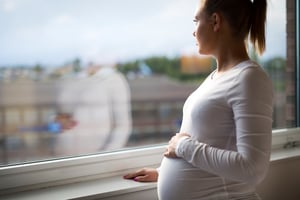Use of the antipsychotic quetiapine during the first trimester of pregnancy does not appear to...
Exposure to Antipsychotics in Womb Not Found to Increase Risk of ADHD, Autism in Offspring

Children whose mothers took antipsychotics during pregnancy do not appear to be at a heightened risk of attention-deficit/hyperactivity disorder (ADHD), autism spectrum disorder (ASD), or low birth weight, reports a study published today in JAMA Internal Medicine. While there was a small increased risk of preterm birth of children exposed to prenatal antipsychotics, additional analysis suggested this may be due to maternal psychiatric illness and not the medication.
“Our study results suggest that if pregnant women have a clinical need for antipsychotics (including first-generation and second-generation antipsychotics), clinicians should not stop administering regular treatment because of a fear of birth outcomes with ADHD, ASD, preterm birth, and small for gestational age,” wrote Zixuan Wang, M.Sc., of University College London and colleagues.
Wang and colleagues used electronic health record data available from all public hospitals and ambulatory clinics in Hong Kong to compare neurodevelopment outcomes in children whose mothers took antipsychotics during pregnancy with those who did not. The sample included 411,251 mother-child pairs of children born between 2001 and 2015; 411,251 were evaluated for ASD, preterm birth, or small gestational age while 333,749 children born between 2001 and 2013 were evaluated for ADHD (ADHD outcomes were tracked for at least six years and ASD outcomes were tracked for at least three years).
In total, 706 children in the study cohort were prenatally exposed to antipsychotics. The analysis suggested there was no association between antipsychotic exposure in pregnancy and subsequent development of ADHD, ASD, or low birth weight.
Children exposed to antipsychotics in utero were at a 40% increased risk of preterm birth (<37 weeks) compared with those children who were not. A follow-up analysis comparing women who took antipsychotics during pregnancy versus those who took antipsychotics prior to pregnancy only identified no increased risk of preterm birth due to antipsychotic exposure. Likewise, an analysis of siblings in which one child was exposed to antipsychotics while the other was not found no differences in the rate of preterm birth or other adverse outcomes.
“These results suggest that maternal psychiatric disorders are associated with a higher risk of neurodevelopmental disorders rather than gestational exposure to antipsychotic drugs,” the authors wrote. “Moreover, gestational exposure to antipsychotic drugs is unlikely to pose a significant risk of preterm birth and small for gestational age in children.”
“This effort to distinguish medication effects from maternal illness, along with the large sample size and length of follow-up, are strengths of this study,” wrote Amanda Yeaton-Massey, M.D., of the University of California, San Francisco, and colleagues in an accompanying commentary. “These findings should provide some reassurance to patients and clinicians who are fearful of antipsychotic medications causing harm to the future child.”
For related information, see the Psychiatric News article “Taking Some Antipsychotics During Pregnancy May Raise Risk of Gestational Diabetes.”
(Image: iStock/Mikumi)
Lock in Lowest Registration Rates for APA’s Mental Health Services Conference
Register by today, Monday, August 16, to lock in the lowest registration rates for APA’s Mental Health Services Conference, to be held virtually on Thursday, October 14, and Friday, October 15. The meeting will feature educational programs and innovations in clinical services designed to ensure equal access to high-quality mental health care for all patients.





